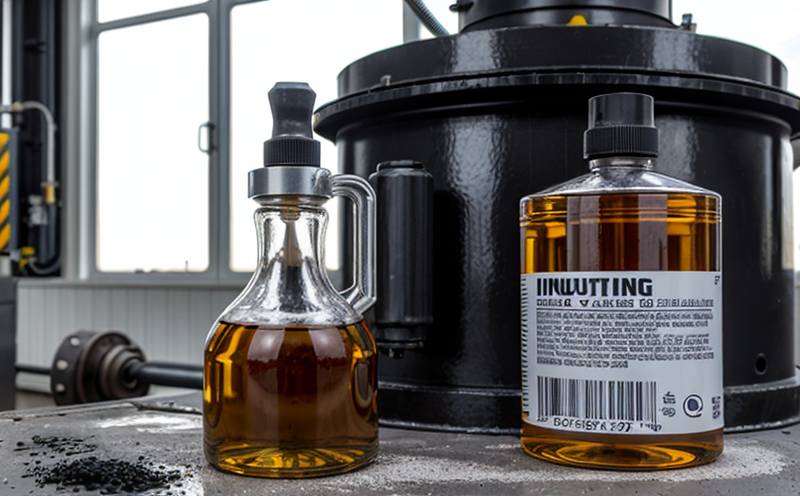ISO 7120 Oil Aging Stability Testing
The ISO 7120 standard is a critical tool used in the chemical testing of industrial oils and additives. This test evaluates the aging stability of lubricants, ensuring that they maintain their performance characteristics over extended periods under various conditions. The primary goal of this test is to determine how well an oil retains its properties after being subjected to thermal, oxidative, and mechanical stresses, which are common in industrial environments.
The process involves subjecting a sample of the oil to controlled conditions that simulate real-world usage. These conditions include temperature fluctuations, exposure to air, and mechanical stress through pumping cycles. The test aims to assess the degradation of key performance indicators such as viscosity, flash point, oxidation stability, and antioxidant levels.
Viscosity is one of the most critical parameters in lubrication because it directly affects a machine's ability to operate efficiently. Changes in viscosity due to aging can lead to increased wear on machinery components, reduced efficiency, and potential breakdowns. The ISO 7120 test helps identify these changes early, allowing for timely maintenance and replacement.
The flash point is another crucial indicator of oil quality as it affects the safety of industrial operations. A lower than expected flash point can indicate that the oil has degraded or contains impurities that could be hazardous in a high-temperature environment. The test ensures that the flash point remains within acceptable limits, thus safeguarding against potential fire hazards.
Oxidation stability is essential for maintaining the integrity of the lubricant's chemical structure. Over time, oils can undergo oxidative reactions leading to the formation of sludge and varnish, which can clog filters and reduce equipment efficiency. The ISO 7120 test helps monitor this process by measuring changes in key components like total base number (TBN), acid value, and viscosity index.
Antioxidant levels are critical for preventing premature degradation of the oil. These additives help neutralize free radicals formed during oxidation processes. By monitoring antioxidant levels, ISO 7120 testing ensures that the oil maintains its protective capabilities against oxidative damage.
The test results provide detailed insights into the aging behavior of industrial oils and their suitability for continued use in demanding applications. This information is invaluable for quality managers and compliance officers who need to ensure that they are using high-quality lubricants that meet industry standards. It also serves as a basis for R&D engineers to develop new formulations, while procurement teams can rely on these results to make informed purchasing decisions.
For industrial settings where the use of proper lubricants is paramount, such as in power plants, manufacturing facilities, and transportation fleets, ISO 7120 testing ensures that the chosen oils perform optimally under harsh conditions. Proper maintenance practices and timely replacement of aged or degraded oils can significantly extend equipment life and reduce operational costs.
The test results are typically reported according to international standards such as ISO 7120, providing a consistent benchmark for evaluating oil performance across different environments and applications. This standardization ensures that the testing process is reliable and repeatable, thereby enhancing trust in the results provided by accredited laboratories like ours.
Why Choose This Test
Selecting ISO 7120 Oil Aging Stability Testing offers several advantages for industrial oil users. Firstly, it provides a comprehensive evaluation of how well your lubricants withstand environmental stresses over time. By simulating real-world conditions, this test ensures that the oils you use will perform consistently and reliably in your specific operational environment.
Secondly, choosing ISO 7120 testing helps identify potential issues early on before they lead to costly downtime or equipment failures. Regular monitoring through this type of testing can help prevent unexpected breakdowns by providing early warnings about declining performance metrics like viscosity changes or increased acidity levels.
Thirdly, adhering to international standards such as ISO 7120 enhances your reputation among clients and stakeholders who value compliance with recognized best practices in lubricant management. This commitment demonstrates a proactive approach towards maintaining high-quality operations within your organization.
Forth, selecting this test allows you to compare different brands or batches of oil objectively based on their aging stability performance. With standardized testing protocols, you can make informed decisions about which products are most suitable for your needs without being influenced by subjective factors such as brand loyalty alone.
Lastly, choosing ISO 7120 Oil Aging Stability Testing supports sustainable practices within your organization by promoting the use of longer-lasting lubricants that reduce waste and environmental impact. By extending the useful life of oils through proper maintenance strategies informed by these tests, you contribute positively to both economic efficiency and ecological responsibility.
Quality and Reliability Assurance
- Consistent Results: Our ISO 7120 Oil Aging Stability Testing adheres strictly to international standards ensuring consistent results across all samples tested. This consistency builds confidence in the reliability of our findings.
- Traceable Procedures: Every step in our testing process is meticulously documented and traceable back to the original sample, providing transparency throughout the entire evaluation procedure.
- Accurate Reporting: We provide detailed reports that not only summarize key findings but also offer actionable insights for improving lubricant performance or making informed purchasing decisions.
- Compliance Verification: By meeting rigorous quality control measures, we ensure that our testing complies with relevant regulations and guidelines set forth by international bodies like ISO and ASTM. This compliance gives you peace of mind knowing that your lubricants meet stringent industry standards.
The combination of these factors guarantees high-quality outputs from every test conducted here, making us a trusted partner for industries relying heavily on reliable performance from their industrial oils and additives.





